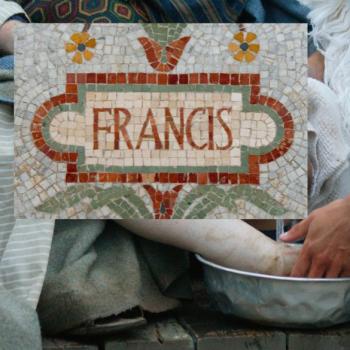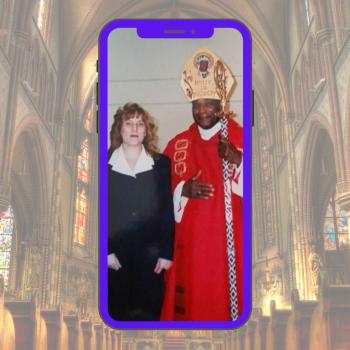Dr. John Zmirak is Writer-in-Residence at Thomas More College of the Liberal Arts in New Hampshire, and author most recently of The Bad Catholic's Guide to the Seven Deadly Sins.
Amy Welborn
Pope Benedict and the Abandonment of the Self
Rather, the decisive thing is that we enter into something that is much greater. That we can get out of ourselves, as it were, and into the wide open spaces. (Light of the World, 105)
As I read Light of the World, I was continually struck by the way in which abandonment of the self to God's will underlies so much of what Pope Benedict says.
I think those puzzled by him, who try to fit him into this or that box, might do well to reflect on what he says on . . . everything . . . in this light.
Whether it's matters of personal spirituality -- how he reacted to and accepted his election as pope, how he lives and governs the Church -- or the issues of the day, from the sexual abuse crisis to evangelization to liturgy -- Pope Benedict consistently turns the question back to this spot. I am a Christian; that means, as Paul says, it is not I, but Christ who lives in me. The more I put my own ego, desires, and agenda aside, the more closely I cleave to Christ.
And what happens then? It's what is alluded to in the quote above: we're loosened from the cramped, narrow self-centeredness of sin and brought into the expansive presence of God. "Wide open spaces" -- and how interesting that this is an answer to a question about liturgy.
Liturgy, surprisingly (or not), is an arena of Church life in which those egos, desires, and agendas are particularly poised to come into play. We've all seen it: musicians who are keen to perform for us, priests whose demeanors as they celebrate draw attention to themselves, whose homilies are exercises in self-indulgence. Masses in which the liturgy given by the Church is left behind in favor of ad-libbing prayers and celebrations of individual and group achievement and awesomeness.
And if we're honest, we've seen it in ourselves as well, as we settle into our pew, waiting to be entertained, hoping to "get something out of Mass," tuning out when the scriptures challenge us or the postures ask that we humble ourselves.
As Pope Benedict says of the liturgy in this interview, it's the most important thing the Church does:
The liturgy is the act in which we believe that he enters our lives and that we touch him. It is the act in which what is really essential takes place: We come into contact with God. He comes to us -- and we are illumined by him. (155)
That's not going to happen if we're not receptive. Our receptivity, in part, is shaped by the liturgy. For those seeking to understand Pope Benedict's liturgical program, this is the place to start. He's written books about it, but it's here in this interview in shorthand. What roots his program is not nostalgia for a Bavarian childhood or a patriarchal clerical agenda. It's simply that when we approach the liturgy as something received, as something in which we participate with millions of other disciples, past and present, as the place where we encounter this loving God so profoundly, we are more encouraged to be receptive than we are when we see liturgy as a constantly-changeable reality that is really about us.
"The point," he says to Seewald, "is to go out of and beyond ourselves, to give ourselves to him, and to let ourselves be touched by him . . . to let ourselves be snatched out of the mere momentary situation; to enter into the totality of the faith, to understand it, to take part in it interiorly, and, on that basis, to give the liturgy the worthy form that makes it beautiful and a source of joy."
And therefore, in the irony that all the saints have discovered, as we abandon ourselves, we find ourselves, at last.
Amy Welborn is the author of Come Meet Jesus: An Invitation from Pope Benedict XVIand she blogs at http://amywelborn.wordpress.com.
Mark Shea
Cue the Darth Vader Theme!
What's the big deal with what Benedict said? His point, for anybody with two brain cells to rub together to see, is that somebody who has lived a sinful life can take a modest and imperfect step toward forgetting himself and try to do something for somebody else. That doesn't automatically make him a hero or a saint, nor does it baptize the details of his attempt at self-sacrificial decency as a Good Thing. So when Darth Vader -- after betraying the Jedi, killing a bunch of children, acting for years as the lieutenant of the Most Evil Man in the Galaxy, destroying Alderaan, torturing Han Solo, and trying with might and main to kill Luke Skywalker -- finally feels a tiny pang of conscience after watching his own son be tortured in the most sadistic manner possible and tosses Emperor Palpatine down an elevator shaft, we can say that there has been "a first step in assuming moral responsibility," a first eensy weensy, itsy bitsy step. We can't say, "Pope approves throwing people down elevator shafts."




